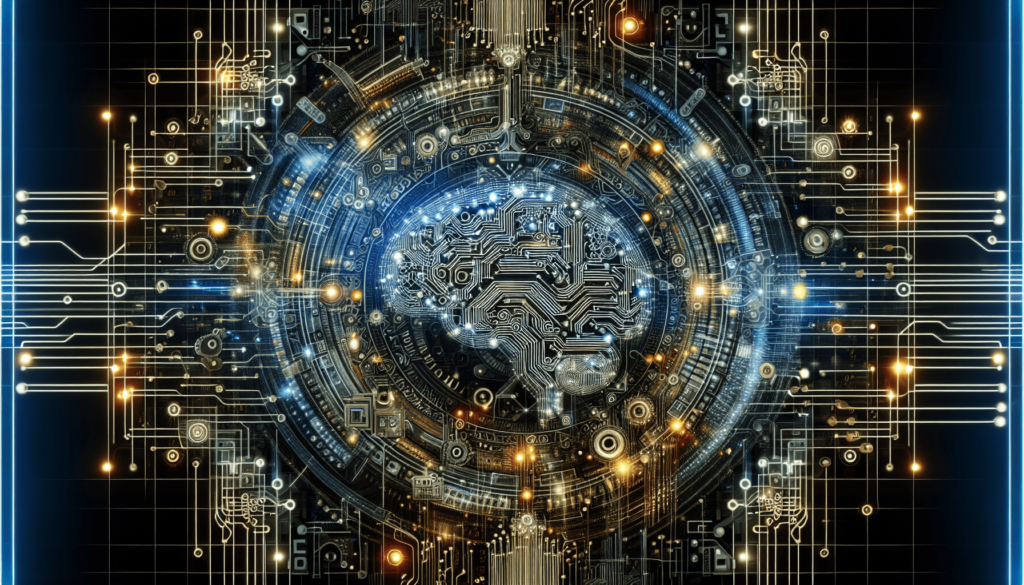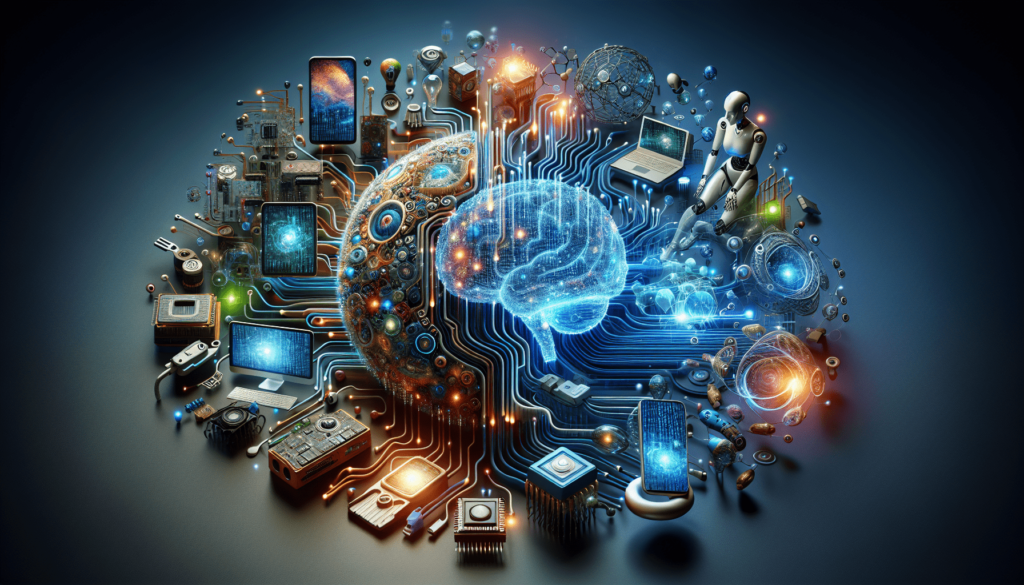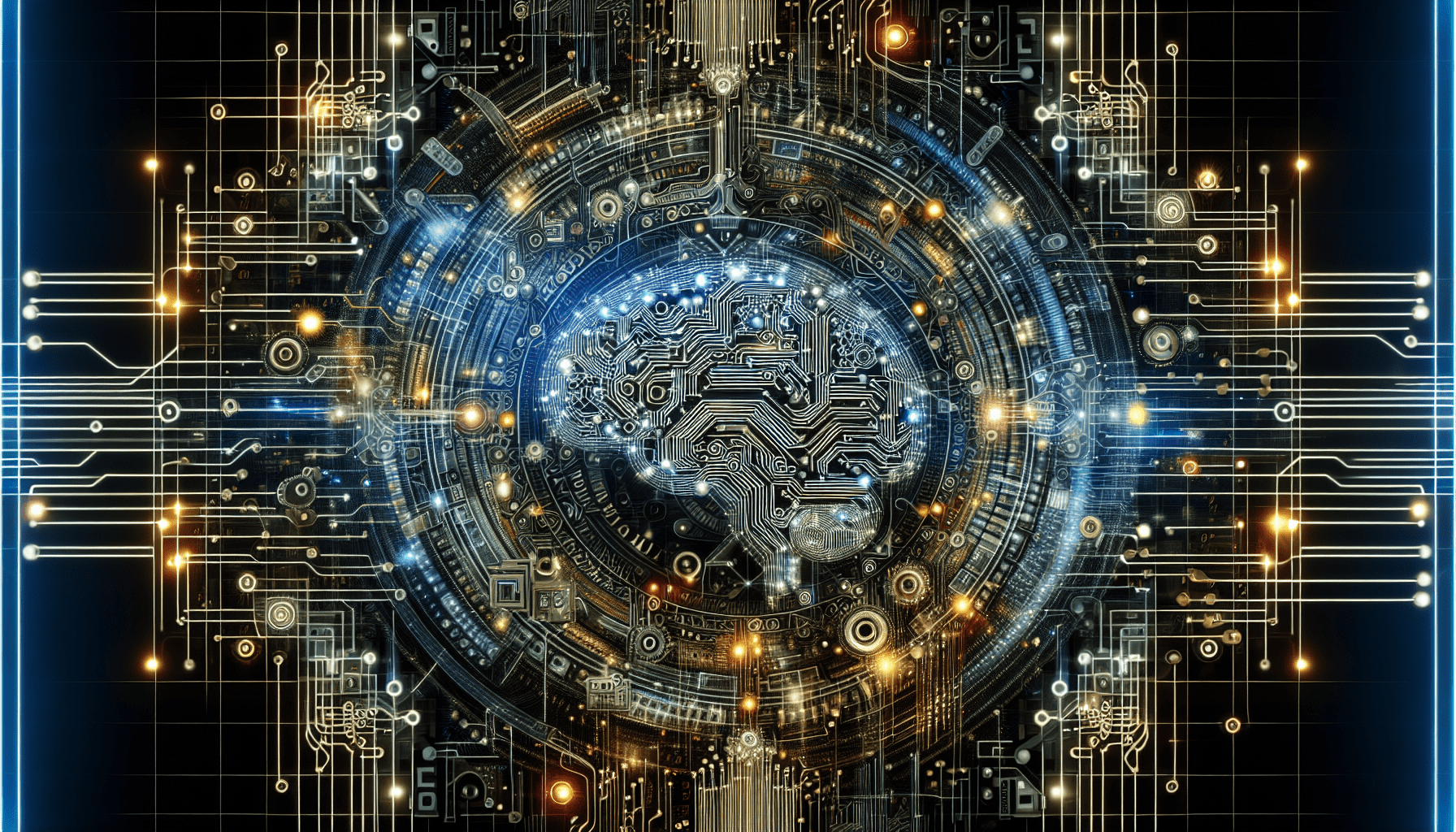AI, or artificial intelligence, has become an indispensable component of modern technology, revolutionizing various industries and transforming the way we live and work. From autonomous vehicles to virtual assistants, AI has proven its worth by enhancing efficiency, improving accuracy, and providing innovative solutions. In this article, we will explore the diverse applications of AI in our daily lives, highlighting its significant impact and potential for future advancements. So, buckle up and get ready to explore the fascinating world of AI and how it is reshaping our technological landscape.

AI in Healthcare
Medical Diagnosis
AI has greatly transformed the field of medical diagnosis by providing accurate and efficient analysis of various diseases and conditions. Through advanced algorithms and machine learning models, AI is capable of analyzing large amounts of medical data and identifying patterns that may go unnoticed by human doctors. By utilizing AI in medical diagnosis, healthcare professionals can save time and improve patient outcomes by quickly and accurately identifying diseases and recommending appropriate treatment plans.
Personalized Treatment
One of the most promising applications of AI in healthcare is personalized treatment. AI algorithms can analyze patient data, including medical history, genetic information, lifestyle factors, and treatment outcomes, to develop personalized treatment plans. This not only improves the effectiveness of treatment but also reduces the risk of adverse reactions and side effects. AI-powered systems can even continuously monitor patients’ responses to treatment and make adjustments in real-time, ensuring that the treatment remains personalized and optimal.
Health Monitoring
AI plays a vital role in facilitating health monitoring for individuals. Wearable devices equipped with AI algorithms can continuously collect and analyze data such as heart rate, sleep patterns, activity levels, and even blood glucose levels for diabetic patients. This data is then used to provide personalized feedback and insights related to overall health and well-being. AI-powered health monitoring systems can detect anomalies or early signs of potential health issues, allowing individuals to take proactive measures and seek appropriate medical care when necessary.
AI in Transportation
Autonomous Vehicles
The integration of AI in transportation has revolutionized the automotive industry with the development of autonomous vehicles. AI-powered technologies such as computer vision, machine learning, and sensor fusion enable self-driving cars to navigate roads and traffic conditions safely and efficiently. Autonomous vehicles have the potential to reduce accidents caused by human error, enhance transportation efficiency, and provide mobility solutions for individuals who are unable to drive. Additionally, AI algorithms continuously learn from real-world driving scenarios, further improving the safety and performance of autonomous vehicles.
Traffic Management
AI-based traffic management systems utilize real-time data from various sources such as traffic cameras, sensors, and GPS devices to optimize traffic flow and reduce congestion. These systems can analyze traffic patterns, predict traffic conditions, and provide real-time updates to drivers, helping them choose the most efficient routes. By improving traffic management, AI helps reduce travel times, fuel consumption, and carbon emissions, leading to a more sustainable transportation system.
Predictive Maintenance
AI technology is also being used in transportation for predictive maintenance. By analyzing data from sensors embedded in vehicles and monitoring various factors such as engine performance, tire wear, and battery health, AI algorithms can predict potential failures or malfunctions before they occur. This allows for timely maintenance and repairs, reducing the risk of costly breakdowns, improving vehicle reliability, and minimizing downtime. Predictive maintenance not only saves money but also improves overall transportation efficiency and safety.
AI in Finance
Risk Assessment
AI has transformed the field of finance by enabling more accurate and efficient risk assessment. Machine learning algorithms can analyze vast amounts of financial data, market trends, and historical patterns to identify potential risks and predict future outcomes. This helps financial institutions make informed decisions regarding investments, loans, and insurance. AI-powered risk assessment models can also detect anomalies or suspicious activities, aiding in fraud prevention and compliance with regulatory requirements.
Fraud Detection
AI algorithms play a crucial role in detecting fraudulent activities in the financial industry. By analyzing vast amounts of transactional data and identifying patterns that may indicate fraudulent behavior, AI-powered systems can quickly flag suspicious transactions or accounts for further investigation. This helps prevent financial losses, protect consumers, and maintain the integrity of the financial system. Machine learning models continuously learn from new data, allowing them to adapt and evolve to detect emerging fraud patterns.
Algorithmic Trading
AI has revolutionized the field of algorithmic trading, where computer algorithms execute trades based on predefined rules and market conditions. AI algorithms can analyze vast amounts of financial data, news articles, social media sentiment, and other factors in real-time to make trading decisions. These algorithms can quickly identify profitable opportunities, execute trades at high speeds, and adapt to changing market conditions, ultimately improving trading efficiency and profitability.
AI in Education
Personalized Learning
AI in education enables personalized learning experiences tailored to individual students’ needs, abilities, and learning styles. Through adaptive learning platforms, AI algorithms can analyze students’ performance data and provide personalized recommendations and resources to help them progress effectively. This helps students learn at their own pace, focus on areas that need improvement, and engage in meaningful and relevant educational content.
Automated Grading
AI technology has automated the grading process, relieving educators from the time-consuming task of manually grading assignments and assessments. Through natural language processing and machine learning algorithms, AI can analyze written responses, essays, and multiple-choice questions and provide accurate and consistent grading. Automated grading systems not only save time but also provide immediate feedback to students, allowing them to learn from their mistakes and make improvements.
Virtual Assistants
AI-powered virtual assistants have become valuable tools in educational settings. These virtual assistants can provide students with instant answers to questions, offer explanations, and provide access to additional resources. Virtual assistants can also collect data on student interactions and performance, allowing educators to gain insights into individual and group learning patterns. By leveraging AI, virtual assistants enhance the learning experience and provide personalized support to students.

AI in Customer Service
Chatbots
AI-powered chatbots have become a common feature in customer service. These virtual assistants can interact with customers, answer frequently asked questions, and provide support in real-time. Chatbots utilize natural language processing and machine learning to understand and respond to customer inquiries accurately. By handling routine customer interactions, chatbots free up human agents to focus on more complex issues, resulting in improved customer satisfaction and operational efficiency.
Virtual Call Centers
AI technology has transformed traditional call centers into virtual call centers. Through speech recognition and natural language processing, virtual call centers can handle incoming calls, route them to the appropriate departments, and assist customers with their inquiries. AI-powered call center systems can also analyze customer sentiment and prioritize calls based on their urgency or complexity. This improves call center efficiency, reduces waiting times, and enhances the overall customer experience.
Customer Analytics
AI enables organizations to leverage customer analytics to gain insights into customer behavior, preferences, and needs. By analyzing data from various sources such as customer interactions, social media, and purchase history, AI algorithms can identify patterns and trends, enabling businesses to offer personalized recommendations and targeted marketing campaigns. Customer analytics powered by AI help businesses understand their customers better, build stronger relationships, and deliver exceptional customer experiences.
AI in Manufacturing
Quality Control
AI-powered quality control systems play a crucial role in ensuring product quality and minimizing defects. Through computer vision and machine learning, AI algorithms can analyze visual data from production lines and identify defects or abnormalities in real-time. With automated quality control, manufacturers can detect issues early in the production process, take corrective measures, and reduce scrap and rework. This results in higher product quality, reduced waste, and improved overall efficiency.
Production Optimization
AI technology enables production optimization by analyzing large amounts of data to identify areas for improvement and enhance manufacturing processes. AI algorithms can analyze data from sensors, machines, and other sources to optimize production schedules, allocate resources efficiently, and minimize downtime. Through predictive analytics, AI can also optimize inventory management, anticipate maintenance needs, and streamline supply chain operations, ultimately improving productivity and reducing costs.
Supply Chain Management
AI plays a critical role in supply chain management by providing real-time visibility, predictive analytics, and optimization capabilities. AI algorithms can analyze data from various sources such as suppliers, logistics providers, and market trends to optimize inventory levels, manage demand and supply fluctuations, and ensure timely deliveries. By leveraging AI in supply chain management, organizations can improve responsiveness, reduce inventory carrying costs, and enhance overall supply chain efficiency.
AI in Agriculture
Crop Monitoring
AI technology revolutionizes crop monitoring by utilizing remote sensing, satellite imagery, and machine learning algorithms to monitor crop health, growth, and yield. AI-powered systems can analyze data such as temperature, humidity, soil moisture, and vegetation indices to identify areas of stress or disease in crops. This allows farmers to take timely action, optimize irrigation and fertilization, and prevent crop loss. Crop monitoring through AI helps improve agricultural productivity, conserve resources, and promote sustainable farming practices.
Precision Farming
AI enables precision farming, which involves utilizing data-driven insights to optimize agricultural practices at a highly precise level. AI algorithms can analyze various data sources such as soil samples, weather conditions, and historical crop performance to provide recommendations for optimal planting, fertilization, and pesticide application. Precision farming minimizes resource wastage, maximizes crop yields, and reduces environmental impact.
Automated Harvesting
AI technology is transforming harvesting processes through automation. AI-powered robotic systems equipped with computer vision and machine learning can identify and harvest crops with precision and efficiency. Automated harvesting reduces labor costs, improves harvesting speed, and minimizes crop damage. By leveraging AI in harvesting, farmers can increase operational efficiency and meet the rising demand for agricultural products.
AI in Cybersecurity
Threat Detection
AI plays a crucial role in cybersecurity by detecting and mitigating threats in real-time. AI algorithms analyze large volumes of data, network traffic patterns, and user behavior to identify potential security threats and anomalies. By continuously monitoring systems and network activity, AI-powered cybersecurity solutions can promptly detect and respond to cyberattacks, preventing data breaches and minimizing the impact of security incidents.
Vulnerability Assessment
AI technology enhances vulnerability assessment by automating the process of identifying weaknesses and potential entry points in computer systems and networks. AI algorithms can analyze code, network configurations, and system architectures to identify vulnerabilities and recommend appropriate mitigation measures. Automated vulnerability assessment saves time, improves accuracy, and helps organizations proactively address security risks.
Behavioral Analysis
AI enables behavioral analysis in cybersecurity, which involves understanding and predicting human behavior to detect malicious activities. AI algorithms can analyze user behavior, network traffic, and system logs to identify anomalies or suspicious patterns that may indicate a cybersecurity threat. By utilizing behavioral analysis, AI-powered systems can detect insider threats, unauthorized access attempts, and other malicious activities that traditional security measures may miss.
